(MENAFN- Brazil-Arab News Agency (ANBA))
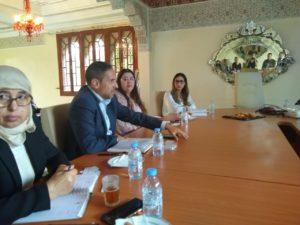
Rabat – Representatives of the Brazilian business sector that are in Morocco accompanying the mission of the Ministry of Agriculture, Livestock and Supply of Brazil asked the country to cut poultry export tariffs. The group met with industry associations on Thursday (13) in the capital city Rabat.
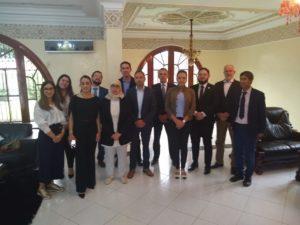
Brazilians were welcomed at the FIVIAR headquarters
Although Brazil is the world's largest poultry exporter, the Moroccans don't import the product from the country. The import tariff for Morocco to buy whole chicken and frozen cuts from Brazil is 100%. For processed poultry products, the tax is 40%. Frozen beef has to pay an even higher tariff of approximately 200% to get into the Moroccan market.
Morocco is seeking to develop its local beef industry , and Seara Alimentos commercial director in Dubai, Eduardo Garcia (pictured in opening photo, C), suggested the reduction of the poultry tariffs and help the Moroccans in the development of cattle. Seara is part of the Brazilian business group JBS. Garcia discussed the matter at the Interprofessional Federation of Red Meats ( FIVIAR ), where the Brazilians were welcomed by councilor Said Tazi, director Khadija Chajai, and Chamber of Agriculture of the Casablanca-Settat Region president Abdelfattah Ammar.
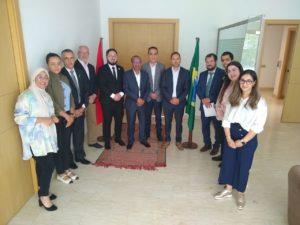
Meeting with FENAGRI and local businesspeople
The Moroccans agreed to send the request to the poultry industry association. They explained that the Moroccans do not have the habit of buying frozen poultry products at the supermarket but usually buy living animals in the city markets. There are also no beef imports from Brazil, but the two countries are in the final approval phase of a health certificate for Brazil to sell living cattle to Morocco.
The Seara's executive made a brief presentation on the company to the Moroccans. He said that JBS is the world's largest beef and poultry producer. Over 100,000 head of cattle are slaughtered each day in its operations in Brazil and the United States.“We cater to the local market in Brazil and the US, but since our production is very large, exports are essential for us, as we export a large part of our production,” Garcia said.
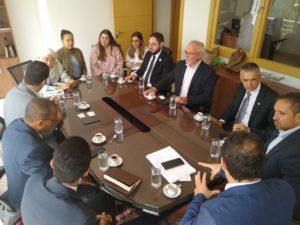
Discussions with the Moroccan private sector
JBS has 253,000 employees.“Morocco is a very small market for our beef products since you have your local production, and we get that. However, regarding poultry aspect, we could potentially work together to figure out how we could have a little more access,” Garcia said.
The meeting was also attended by representatives from the Brazilian Confederation of Agriculture and Livestock (CNA), the Organization of Brazilian Cooperatives (OCB), the Arab Brazilian Chamber of Commerce (ABCC), the Embassy of Brazil in Morocco and certifier Cdial Halal.
Just like JBS invited the Moroccans to visit Brazil to learn more about the company, so did the CNA technical director Reginaldo Minaré and OCB representative Sérgio Feltraco. Minaré invited the Moroccans to learn about Brazil's cereal production system and livestock and Feltraco to see up close the work of agriculture cooperatives.
Egypt
The delegation went through Jordan and Egypt. In both countries, the meat industry was a topic of the meetings. Industry association ABPA Markets director Luis Rua says that there were many talks in Jordan and Egypt, where he accompanied the mission.“They are historical markets to which we have exported for a long time, and we want to keep exporting our animal protein, our poultry, thus helping the food security in the region,” Rua said.
According to the director, Brazil sells approximately 72,000 tonnes of poultry a year to Jordan and 35,000 tonnes to Egypt. The talks with Egyptians revolved around clearing import licenses to chicken cuts from Brazil as, Rua said, Brazil exports basically only whole chickens to the country.“We have companies in Brazil that could supply this food to Egypt,” Rua said.
Halal
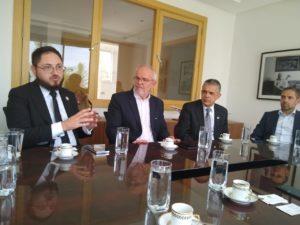
Saifi talked about halal production in Brazil
The business group had other meetings on Thursday in Rabat, one of them with National Federation of Agribusiness (FENAGRI) director Hamid Fellouni and animal protein company Koutoubia Holding executives Mohamed Amine Bouchouf and Ahmed Daoudi. During the meeting, Cdial Halal Operations director Ahmad Saif gave a brief explanation about the relevance of Brazil in halal production. The country is a leading halal producer and the world's largest poultry exporter.
Representatives of the delegation also had meetings at the Moroccan Investment and Export Development Agency (AMDIE), where Saifi and ABCC Institutional Relations director Fernanda Baltazar discussed a potential cooperation between Morocco and Brazil and the benefits of a free trade agreement between the Arab country and Mercosur that is in talks.
Fertilizers
The mission that the companies participated in was led by Agriculture, Livestock and Supply minister Marcos Montes, who had meetings with authorities and businesspeople in the countries. The trip aimed at ensuring the fertilizer supply to Brazil. Jordan, Egypt and Morocco are producers in the sector. The appointments started on Saturday (7) and is ending on Friday (13).
Here's more on this:
- Morocco's OCP to open phosphate plant in Brazil
- Egyptians ask for Brazil's help to contain food prices
- Egypt: Brazil's Marcos Montes discussed food security
- Brazil's Embrapa pens agreement with Egyptian institute
- Brazilian minister talked fertilizer supply with Egyptians
- Jordan, Brazil seek to boost bilateral trade
- Jordanians seek phosphate joint venture with Brazil
- Jordanian company to increase potash exports to Brazil
Translated by Guilherme Miranda
The post Brazilians ask for smaller tax to sell poultry to Morocco appeared first on Agência de Notícias Brasil-Árabe .
MENAFN13052022000213011057ID1104209788
Legal Disclaimer:
MENAFN provides the information “as is” without warranty of any kind. We do not accept any responsibility or liability for the accuracy, content, images, videos, licenses, completeness, legality, or reliability of the information contained in this article. If you have any complaints or copyright issues related to this article, kindly contact the provider above.